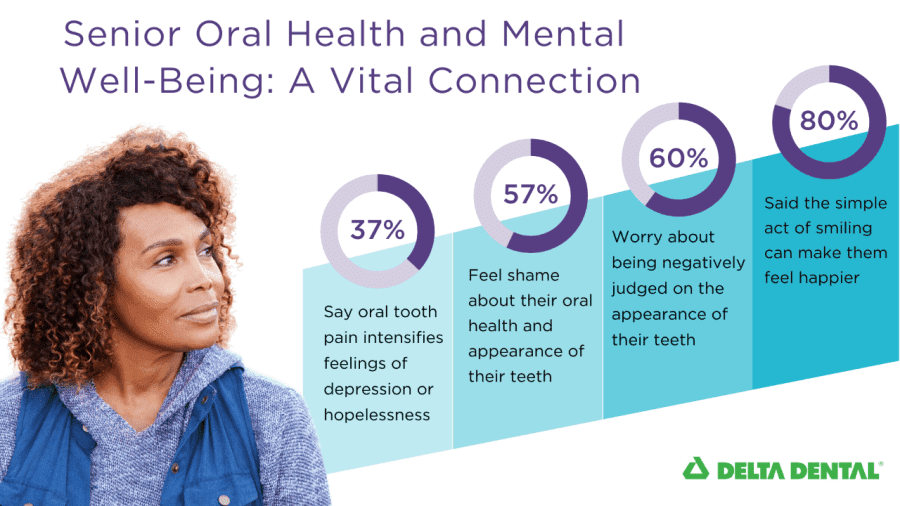Shocking survey results: How oral health affects senior mental well-being

May is recognized as Mental Health Awareness Month, during which we conducted a comprehensive survey among seniors to explore the unexpected correlation between oral health and mental well-being.
Mental health issues cause many seniors to neglect their oral health, and poor oral health in turn causes many older Americans to experience mental health issues, creating a harmful feedback loop of mouth pain, depression, anxiety and low self-esteem among Americans aged 50 and up.
The findings are part of Delta Dental’s 2023 Senior Mental and Oral Health Report, which asked more than 1,000 older Americans about their oral health habits and stratified their self-reported indications of mental wellbeing.
Steven Robins – Patient at Dientes Community Dental
Survey points to link between mental health issues and poor oral health
More than half of survey respondents said they’ve experienced feelings of depression or hopelessness frequently or on occasion in the last six months. Among this majority:
- More than one in three said they are likely to neglect brushing and flossing their teeth.
- 37% said that oral pain intensifies their feelings of depression and hopelessness. This connection is even more prominent among Hispanic and African American respondents.
- 60% said they worry about being negatively judged based on the appearance of their teeth.
Among the nearly 20% who reported a very high incidence of depression and anxiety:
- More than one in four indicated the last time they went to a dentist for a routine check-up or cleaning was more than three years ago.
- Over half (57%) said they feel shame about their oral health and the appearance of their teeth, compared to only 18% of those who said they experienced less frequent or no depression in the past six months.
Other key findings of the survey include:
- 45% of all respondents, regardless of mental health status, say they are more likely to notice changes in their mood or mental health when experiencing dental pain or discomfort.
- One in four Americans aged 50 and over feel negatively about themselves when brushing and flossing because they don’t like the way their teeth look.
- More than one in three of all respondents smile less than they did when they were young due to deteriorating oral health or teeth.
- 80% of all respondents say the simple act of smiling can make them feel happier – and among those who indicate they frequently experience feelings of depression or hopelessness, 78% still share that view.
Understanding the mind-mouth connection
The survey results point to a strong connection between our oral health and our mental wellbeing.
“The link between mental health and oral health is really powerful,” says Sarah Chavarria, President of Delta Dental. “These results show us that addressing mental health is critical, especially as it relates to its impact on our oral and overall health. Everyone, regardless of age, ethnicity or gender, should feel uninhibited to smile and take care of their whole selves.”
Dr. Daniel Croley, Delta Dental’s Chief Dental Officer emphasizes the importance of visiting the dentist for anyone experiencing oral health issues or pain. “Beyond causing discomfort and impeding our day-to-day lives, oral pain can be an indication that something more serious is going on,” he says. “Our mouth and our body are not separate entities – the pain you’re feeling may be caused by inflammation of the gums, for example, which can be linked to diabetes, heart disease and even an increased risk of Alzheimer’s disease. Regular visits to your dentist can help you keep those conditions and diseases in check.”
Talking to dentists about mental health
Delta Dental recommends having open conversations with your dentist about how your mental state may be impacting your oral health habits. If you’re struggling with any issues, your dentist can give you tips for taking small, manageable steps to develop better oral health habits and may refer you to a licensed professional if mental health issues persist.
Delta Dental is committed to providing older adults with consistent, quality access to oral health care, improving education and driving lasting policy changes to address systemic issues. To learn more about the survey, view Delta Dental’s full report.
Survey methodology
Dental Dental’s Senior Mental and Oral Health Survey reflects feedback from Americans aged 50 and older and provides a look into how older Americans think about their mental and oral health. Delta Dental commissioned Atomik Research, an independent market research agency, to conduct an online survey from a national sample size of 1,016 Americans 50 years of age or older that was representative of the race/ethnicity and gender composition of the senior population across the United States. The margin of error is +/- 3 percentage points with a confidence level of 95 percent. Fieldwork took place between April 1 and April 7 of 2023.
If you would like to learn more, read our full press release here.